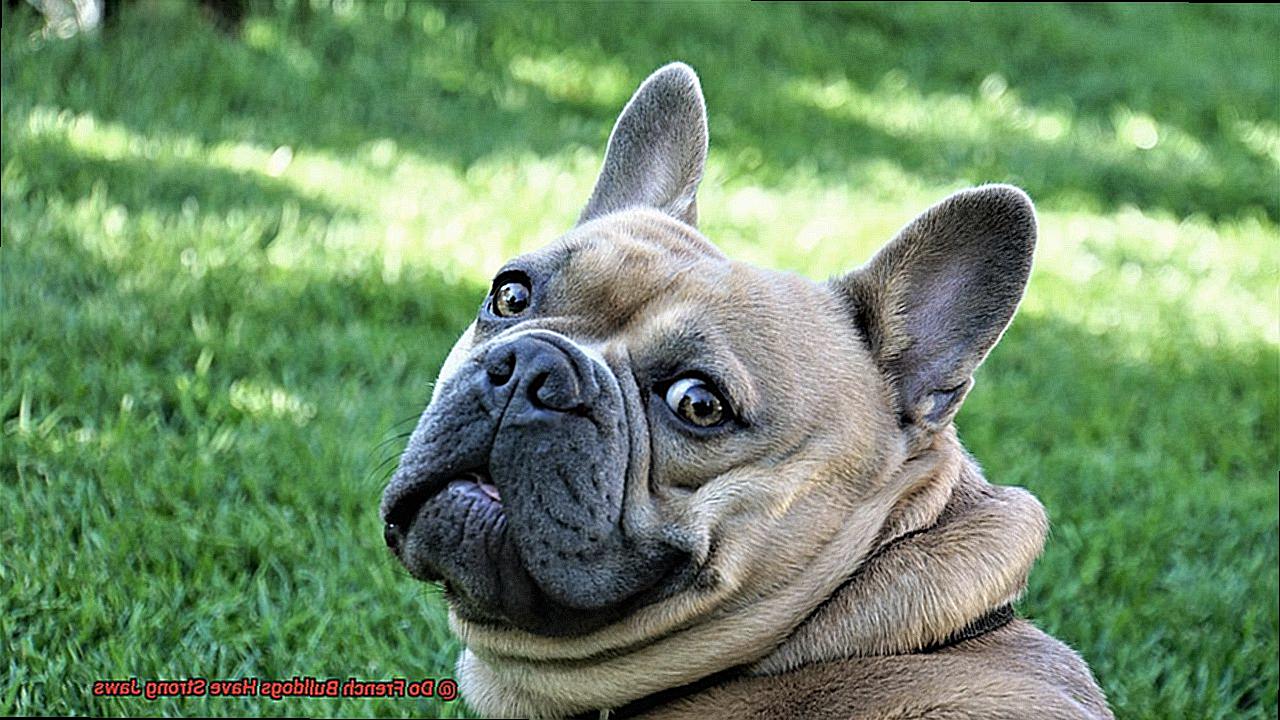Do French Bulldogs Have Strong Jaws?
Ready to sink your teeth into a fascinating topic? Today, we’re going to talk about the jaw strength of French Bulldogs.
These little cuties have taken the world by storm with their irresistible looks and playful nature. But what about their jaws?

Are they as powerful as they are adorable? Well, get ready for some jaw-dropping facts because we’re about to explore just how strong those French Bulldog chompers really are.
So, grab your favorite beverage, settle in, and let’s sink our teeth into this juicy topic.
Do French Bulldogs have strong jaws
Contents
- 1 Do French Bulldogs have strong jaws
- 2 Anatomy of a French Bulldog’s Jaw
- 3 Bite Force of French Bulldogs
- 4 French Bulldogs as Companion Dogs
- 5 Potential Issues Affecting Jaw Strength
- 6 The Role of Breeding in Jaw Strength
- 7 Dental Health and Jaw Strength
- 8 Exercise and Nutrition for Healthy Jaws
- 8.1 Regular exercise: Pump up the jaw muscles.
- 8.2 Chew toys: The ultimate workout for those chompers.
- 8.3 Dental-friendly diet: Fuel those strong jaws.
- 8.4 Dental hygiene routine: Brush away dental troubles.
- 8.5 Professional dental cleanings: Polishing those pearly whites.
- 8.6 Regular veterinary check-ups: Keeping an eye on those jaws.
- 9 Training to Prevent Aggression
- 10 Conclusion
French Bulldogs are beloved for their adorable appearance and affectionate nature. But have you ever wondered about the strength of their jaws? In this blog post, we will dive into the fascinating world of French Bulldog jaws and explore why they possess such powerful bites.
Unleashing the Power:
- Genetic Heritage: French Bulldogs are descendants of ancient fighting dogs bred for their tenacity and strength. These traits have been passed down through generations, contributing to the development of strong jaws in modern-day French Bulldogs.
- Anatomy Matters: The structure of a French Bulldog’s skull plays a vital role in determining the strength of their jaws. Their broad and square-shaped skull provides ample space for the attachment of strong muscles that control jaw movement, enabling them to exert force when chewing or holding onto objects.
- Bite Force: While specific studies on French Bulldogs’ bite force are lacking, it is believed that their jaws can generate a considerable amount of pressure for their size. The muscular structure of their jaw and the leverage created by their short snout contribute to this impressive biting power.
Promoting Healthy Chewing Habits:
- Suitable Chew Options: To satisfy your French Bulldog’s natural chewing instincts and promote good dental health, provide them with appropriate chew toys or bones specifically designed for dogs. Avoid objects that are too hard or small, as they can pose a choking hazard or damage their teeth.
- Training and Socialization: While French Bulldogs are generally friendly and affectionate, proper training and socialization from a young age are crucial to ensure they exhibit appropriate behavior around people and other animals.
Anatomy of a French Bulldog’s Jaw
If you’ve ever wondered about the mighty jaw of these adorable pups, you’re in for a treat. In this blog post, we’ll explore the anatomy of a French Bulldog’s jaw, from the sturdy mandible to their unique underbite. We’ll also delve into their bite force and how it affects their overall health. So, sit back, relax, and let’s dive into the fascinating world of French Bulldog jaws.
The Anatomy of a French Bulldog’s Jaw:
Mandible: The Strong Foundation
- The mandible, or lower jaw, is a robust bone that supports the teeth and muscles involved in chewing and biting.
- It connects to the skull at two points called temporomandibular joints (TMJ), allowing for movement and flexibility.
Brachycephalic Skull: Unique Jaw Shape
- French Bulldogs have a shortened skull, known as brachycephalic, which affects their jaw alignment and positioning.
- This results in a charming underbite where the lower jaw protrudes slightly beyond the upper jaw.
Bite Force and Dental Health:
Strong Jaw Muscles: Mighty Chompers.
- Despite their underbite, French Bulldogs possess strong jaw muscles like the masseter and temporalis.
- These muscles generate the force needed for chewing and biting, ensuring they can handle their dietary needs.
Dental Formula: Perfect Teeth for Chewing
- French Bulldogs have 42 teeth arranged in an efficient dental formula.
- From incisors to molars, their teeth allow them to grip and tear food effectively.
Dental Issues: Watch Out.
- Due to their unique jaw structure, French Bulldogs may be prone to dental issues like overcrowding or misalignment of teeth.
- Regular dental care is crucial to prevent these issues and promote overall oral health.
The Impact on Health:
Brachycephalic Airway Syndrome: Breathing Concerns
- French Bulldogs, with their compressed facial structure, may be prone to brachycephalic airway syndrome.
- This can affect their breathing and comfort, making it important to monitor their respiratory health.
Temperature Regulation: Keep Cool.
- Narrow airways in French Bulldogs can make it challenging for them to regulate their body temperature.
- Be mindful of their exposure to heat and ensure they have access to cool environments.
Bite Force of French Bulldogs
French Bulldogs, with their adorable squishy faces and compact bodies, may not strike you as having a strong bite force. But don’t let their cute appearance fool you. These little powerhouses pack more bite than meets the eye. In this blog post, we’ll explore the bite force of French Bulldogs and how it affects their dental health. Buckle up, because we’re about to dive deep into the world of French Bulldog jaws.
The Bite Force Unleashed:
- French Bulldogs have a bite force of approximately 305 pounds per square inch (psi).
- While this may not be as impressive as some other breeds, such as the Rottweiler or the German Shepherd, it’s still nothing to scoff at.
- With their moderate bite force, French Bulldogs can easily chew through regular dog food and enjoy a variety of chew toys designed for their size.
The Impact on Dental Health:
- French Bulldogs’ brachycephalic (short-muzzled) skull structure can affect their dental health.
- This unique facial structure often leads to dental problems such as overcrowding of teeth, misalignment, and gum disease.
- Regular dental care is crucial for maintaining their oral health. Brushing their teeth regularly and providing appropriate chew toys can help prevent these issues.
Dental Care Tips for French Bulldogs:
- Brush your French Bulldog’s teeth regularly using a dog-friendly toothbrush and toothpaste.
- Use appropriate chew toys that are specifically designed for their size and breed.
- Schedule regular dental check-ups with your veterinarian to catch any potential dental issues early on.

Their Friendly Nature Shines Through:
- While French Bulldogs may not have the strongest bite force, they excel in other areas.
- They are known for their friendly and affectionate nature, making them excellent family pets.
- French Bulldogs are not typically bred for guarding or protection purposes that require a powerful bite force. Instead, they steal hearts with their charming personalities.
French Bulldogs as Companion Dogs
When it comes to choosing a companion dog, French Bulldogs are in a league of their own. These adorable little powerhouses have a reputation for being friendly, affectionate, and oh-so-loyal. But what about their strong jaws? Can these cute squishy faces be trusted? Fear not, my fellow French Bulldog owners, because in this post, we’re going to explore why French Bulldogs make excellent companion dogs, despite their strong jaws.
- Friendly and Affectionate Nature: French Bulldogs are social butterflies. They thrive on human interaction and will do anything to please their owners. Whether you’re snuggling on the couch or going for a walk in the park, your French Bulldog will be right by your side, showering you with love and affection.
- Gentle Disposition: Despite their jaw strength, French Bulldogs are known for their gentle and friendly nature. They are not aggressive or prone to biting. In fact, they are great with children and make fantastic family pets. Just be sure to supervise playtime and avoid any games that might put unnecessary strain on their jaws.
- Proper Chew Toys: French Bulldogs have a natural instinct to chew. It’s important to provide them with appropriate chew toys or bones to satisfy this instinct and prevent destructive behavior. Look for toys specifically designed for their size and jaw strength. This will keep them entertained and save your furniture from any unwanted teething marks.
- Exercise for Strong Muscles: Regular exercise is key to maintaining proper muscle tone in your French Bulldog’s jaws. Daily walks, play sessions, or even agility training can help keep their muscles strong and healthy. Plus, it’s a great way to bond with your furry friend while keeping them fit and active.
So, there you have it – French Bulldogs may have strong jaws, but their temperament and loving nature make them excellent companion dogs. With proper training, socialization, and exercise, you’ll have a loyal sidekick who will bring endless joy to your life. Just remember to provide them with appropriate chew toys, supervise playtime, and keep those muscles strong with regular exercise.
Potential Issues Affecting Jaw Strength
French Bulldogs are beloved for their unique appearance and friendly demeanor. However, their brachycephalic anatomy can pose potential issues affecting their jaw strength. In this article, we will explore common problems that French Bulldogs may face and provide helpful tips to ensure their jaw muscles remain strong and healthy.
Brachycephalic Syndrome:
French Bulldogs are prone to brachycephalic syndrome, a condition that affects their respiratory system. This can indirectly impact jaw strength as breathing difficulties may lead to reduced energy levels and overall muscle weakness. To address this, ensure your Frenchie has proper ventilation, avoid excessive exercise in hot weather, and consult a veterinarian if breathing problems persist.
Dental Problems:
Due to their short faces, French Bulldogs are more susceptible to dental issues such as overcrowding, misalignment, and malocclusion. These problems can hinder proper chewing, resulting in weaker jaw muscles over time. Regular dental check-ups, professional cleanings, and providing appropriate chew toys can help maintain dental health and strengthen the jaw muscles.
Temporomandibular Joint Disorder (TMJ):
TMJ is a condition that affects the joint connecting the jawbone to the skull. French Bulldogs may experience pain, discomfort, or limited mobility in their jaws due to TMJ. If you notice any signs of jaw discomfort or difficulty in movement, it is essential to consult a veterinarian promptly for proper diagnosis and treatment.
Allergies and Inflammation:
Some French Bulldogs may suffer from allergies or food sensitivities that can cause inflammation or swelling in the oral cavity. This inflammation can potentially weaken the jaw muscles over time. Identifying and addressing any underlying allergies or sensitivities through dietary modifications or veterinary guidance can help prevent this issue.
Maintaining Jaw Strength:
To ensure strong jaws in your French Bulldog, consider the following tips:
- Provide a balanced diet that promotes dental health and supports muscle strength.
- Engage in appropriate exercise routines that focus on jaw muscles, such as playing fetch or offering chew toys specifically designed for promoting jaw strength.
- Regularly inspect your Frenchie’s mouth for signs of dental problems or inflammation.
- Follow a dental care routine recommended by your veterinarian, including proper brushing and regular professional cleanings.
The Role of Breeding in Jaw Strength
Those adorable little pups with their short muzzles and friendly personalities. But did you know that their unique facial structure can impact their jaw strength? In this article, we’ll delve into the fascinating world of breeding practices and how they can affect the jaw strength of French Bulldogs. So grab a cup of coffee and get ready to discover the secrets behind those powerful Frenchie jaws.
Breeding for Aesthetics vs Functionality:
When it comes to breeding French Bulldogs, there has been a historical emphasis on aesthetic features, such as that cute little squished face. However, this focus on appearance has sometimes come at the expense of functionality. Breeders striving for that perfect short muzzle may unknowingly compromise the jaw strength of these lovable dogs.
The Consequences of Compromised Jaw Strength:
A compromised jaw strength can lead to a range of health issues for French Bulldogs. Dental problems are common, as their shortened jaws may cause overcrowding or misalignment of teeth. This can result in difficulty chewing, gum disease, and even tooth loss.
Additionally, weakened jaws can contribute to temporomandibular joint disorder (TMJ), which causes pain and discomfort in the jaw joint. Imagine your Frenchie struggling to enjoy their favorite chew toy – not a pleasant sight.
The Importance of Responsible Breeding:
To ensure the future generations of French Bulldogs have strong and healthy jaws, it is crucial for breeders to prioritize health and functionality over purely aesthetic traits. Responsible breeders should conduct health screenings and genetic testing to identify potential dental issues and select breeding pairs with robust jaw structures.
By avoiding breeding dogs with known dental problems and selecting pairs with strong jaws, breeders can contribute to improving the overall jaw strength of French Bulldogs.
Tips for Maintaining Jaw Strength:
While breeding practices play a significant role, there are also steps you can take as a French Bulldog owner to maintain your furry friend’s jaw strength:

- Dental Hygiene: Regularly brush your Frenchie’s teeth to prevent plaque buildup and gum disease. Consult with your veterinarian for appropriate dental care products.
- Chew Toys: Provide your pup with appropriate chew toys designed to strengthen their jaw muscles. Look for toys made from durable materials that encourage chewing and jaw exercise.
- Balanced Diet: Ensure your Frenchie receives a balanced diet that promotes healthy teeth and jaw development. Consult with your veterinarian to determine the best diet for your furry friend.
Conclusion:
Breeding practices have a significant impact on the jaw strength of French Bulldogs. While selective breeding for aesthetic traits has been a common practice, it is essential for breeders to prioritize health and functionality to improve the jaw strength of these lovable pooches.
Dental Health and Jaw Strength
After all, French Bulldogs are known for their unique appearance and lovable personalities. But when it comes to their dental health and jaw strength, what factors come into play? Let’s dive in and uncover the truth.
Genetics: The Backbone of Jaw Strength
Just like humans, French Bulldogs inherit certain traits from their parents, including jaw strength. Genetics play a significant role in determining the overall strength of a French Bulldog’s jaw. Breeding practices can impact the jaw structure, so it’s essential to choose responsible breeders who prioritize the health and functionality of their dogs.
Diet: Fueling the Jaws
A well-balanced diet rich in nutrients is crucial for maintaining healthy teeth and strong jaws in French Bulldogs. Providing high-quality dog food that meets their nutritional needs is key. Avoiding excessive amounts of sugary treats and incorporating dental-friendly options such as dental chews can also benefit their oral health.
Exercise: Strengthening the Jaws
Regular exercise is not only important for keeping your French Bulldog physically fit but also for strengthening their jaws. Engaging in activities that encourage chewing, such as playing with chew toys or participating in interactive feeding puzzles, can help develop and maintain strong jaw muscles.
Dental Care: A Key Component
Proper dental care is vital for maintaining optimal jaw strength in French Bulldogs. Regular teeth brushing using dog-friendly toothpaste can help prevent plaque buildup and gum disease. Additionally, scheduling professional cleanings with your veterinarian and providing appropriate chew toys can contribute to healthy teeth and strong jaws.
Potential Dental Issues: Addressing Weaknesses
French Bulldogs are prone to certain dental issues that can affect their jaw strength if left untreated. Dental malocclusions, periodontal disease, and retained deciduous teeth are common conditions that may weaken their jaws over time. Regular veterinary check-ups can help identify and address these issues early on.
Consult the Experts: Veterinarians and Dental Specialists
When it comes to maintaining optimal dental health and jaw strength in French Bulldogs, it’s always best to consult with professionals. Your veterinarian or a canine dental specialist can provide guidance tailored to your pup’s specific needs, ensuring they have the strongest jaws possible.
Exercise and Nutrition for Healthy Jaws

Today, we’re diving into the world of exercise and nutrition to keep those adorable Frenchie jaws healthy and strong. We’ll explore how regular exercise, chew toys, a dental-friendly diet, a dental hygiene routine, professional dental cleanings, and regular veterinary check-ups can make a world of difference. So grab a cup of tea, cuddle up with your furry friend, and let’s get started.
Regular exercise: Pump up the jaw muscles.
Just like humans, French Bulldogs need their regular exercise to maintain overall health – and yes, that includes their jaws. These lovable pups with their short-muzzled faces sometimes face dental issues. But fear not. Regular exercise can stimulate blood flow and strengthen those jaw muscles. So get out there and play fetch or take leisurely walks to keep their jaws in tip-top shape.
Chew toys: The ultimate workout for those chompers.
French Bulldogs love to chew, so let’s give them something to chew on. Look for chew toys specifically designed for strong chewers. Opt for durable materials that can withstand their mighty jaws. These toys not only promote jaw muscle development but also help keep their teeth clean by reducing plaque and tartar build-up.

Dental-friendly diet: Fuel those strong jaws.
You are what you eat, and the same goes for our furry friends. A dental-friendly diet is essential for maintaining healthy jaws in French Bulldogs. Choose high-quality dog food that supports dental health. Look for ingredients like lean protein, whole grains, and fruits/vegetables that contribute to healthy gums and teeth. A balanced diet will provide the necessary nutrients to keep those jaws strong.
Dental hygiene routine: Brush away dental troubles.
Establishing a dental hygiene routine early on is crucial for preventing oral health problems. Grab a dog-friendly toothbrush and toothpaste, and make brushing your Frenchie’s teeth a regular habit. Don’t forget to use dental wipes or dental chews recommended by your veterinarian to maintain good oral hygiene. Your Frenchie will thank you with a wagging tail.
Professional dental cleanings: Polishing those pearly whites.
Despite our best efforts, professional dental cleanings may still be necessary. These cleanings, performed by veterinarians, remove plaque and tartar buildup and address any underlying dental issues. Regular cleanings help prevent infections or discomfort, ensuring your Frenchie’s jaws stay strong and healthy.
Regular veterinary check-ups: Keeping an eye on those jaws.
Regular visits to the veterinarian are essential for monitoring overall health, including the jaw and oral cavity of your French Bulldog. During these check-ups, the vet can examine your Frenchie’s jaw structure, teeth alignment, and identify any potential issues early on. Catching problems early is key to maintaining those strong jaws.
Training to Prevent Aggression
We all know that these adorable bat-eared beauties are famous for their friendly and affectionate nature. However, like any breed, French Bulldogs can display aggressive behavior if not properly trained and socialized. In this guide, we’ll delve into the techniques that will help you prevent aggression in your furry friend, ensuring a harmonious and wag-tastic relationship.
Types of aggression in French Bulldogs:
- Territorial aggression: Frenchies can become quite possessive of their living space and may display aggression towards unfamiliar people or animals that dare to enter their territory.
- Fear aggression: When a French Bulldog feels threatened or scared, they can unleash their inner “Le Chien Féroce” (the fierce dog) and react aggressively as a defensive mechanism.
- Resource guarding aggression: Some Frenchies may become protective over their food, toys, or other valuable resources and exhibit aggression to safeguard them.
- Dog-to-dog aggression: French Bulldogs may show aggression towards other dogs, especially if they haven’t been properly socialized or have had negative experiences in the past.
Training techniques to prevent aggression:
- Early socialization: Just like sipping café au lait at a Parisian café, early socialization is essential for French Bulldogs. Introduce your pup to various environments, people, and animals from a young age to help them become familiar with different stimuli and reduce the likelihood of fear-based aggression.
- Positive reinforcement: Who doesn’t love a treat? Use reward-based training methods to teach your Frenchie appropriate behavior. Treats, praise, and playtime are pawsome ways to encourage calm and non-aggressive behavior.
- Obedience training: Teaching basic commands such as “Assis.” (sit), “Reste.” (stay), and “Laisse.” (leave it) can establish your authority as the pack leader and prevent your Frenchie from becoming dominant or aggressive.
- Controlled exposure: Gradually expose your French Bulldog to situations that may trigger aggression, such as meeting new people or encountering other dogs. Ensure these encounters are controlled and positive, rewarding your pup for calm behavior.
- Consistency and boundaries: Just like the Eiffel Tower stands tall, set clear rules and boundaries for your Frenchie, and consistently enforce them. This helps them understand what is expected of them and reduces the likelihood of aggressive behavior.
- Seek professional help: If you’re feeling as lost as a tourist in the Louvre, don’t hesitate to seek guidance from a professional dog trainer or behaviorist who specializes in dealing with aggression issues.
Conclusion
In conclusion, it is evident that French Bulldogs possess remarkably strong jaws.
These compact canines may be small in size, but their bite force is nothing to underestimate. With a tenacious grip and powerful muscles, they are capable of exerting considerable pressure when clenching down on objects or engaging in play.
This characteristic not only adds to their charm but also serves practical purposes such as aiding in chewing and self-defense.




